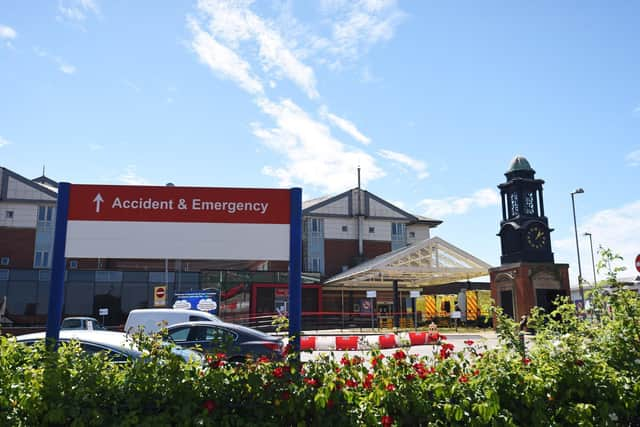Latest report says Blackpool Victoria Hospital requires improvements
and live on Freeview channel 276
Although some progress has been noted at the hospital, the report raises concerns about it being safe and effective in its work.
Inspectors from the CQC (Care Quality Commission) carried out the inspection of services at the hospital, including urgent and emergency care, medical care, critical care and surgical care, due to continuing concerns about the quality and safety of these services.
Advertisement
Hide AdAdvertisement
Hide AdAn inspection of the well-led domain of the trust overall was also carried out. Ann Ford, CQC’s deputy chief inspector for the north, said concerns were raised that patients were coming to harm while on the waiting list for significant lengths of time, and also noted that some under-pressure staff did not feel valued.


Like many hospitals it has been under pressure because of Covid and recently a critical incident was declared at the hospital as staff tried to cope with a surge in omicron infections across Blackpool and the Fylde coast.
But the report concludes that, because of continuing concerns, the hospital still requires improvement overall and in all key areas.
The Blackpool Teaching Hospitals NHS Foundation Trust, which runs the hospital, points to the hospital’s rating as ‘good’ for being caring but acknowledges improvements are needed and says it will work with the CQC to achieve the standards needed.
Findings in the report showed that:


Advertisement
Hide AdAdvertisement
Hide Ad*The trust remains rated as requires improvement overall and it requires improvement for being safe and effective.
*Well-led has moved up from inadequate to requires improvement
*Surgical care and critical care remained rated as requires improvement,
*Medical care moved up from inadequate to requires improvement
Advertisement
Hide AdAdvertisement
Hide Ad*Urgent and emergency care went down from requires improvement to inadequate.
*The trust remains rated as good for being caring.
Due to the issues found during this inspection, the trust was issued with a warning notice requiring them to take action to ensure significant improvements are made with regards to assessing and managing risks to patients who are waiting to receive care and treatment.
The report said effective systems and processes must be in place to make sure incidents are dealt with appropriately so lessons can be learnt to prevent them happening again.
Trish Armstrong-Child, chief executive of Blackpool Teaching Hospitals NHS Foundation Trust, took up the role in September as the Care Quality Commission (CQC) arrived at Blackpool Victoria Hospital to begin their inspection of core services.
Advertisement
Hide AdAdvertisement
Hide AdShe said: “Overall, the CQC rating for Blackpool Teaching Hospitals NHS Foundation Trust remains as Requires Improvement (RI).
“The Trust recognises and acknowledges the areas highlighted for action and will work with the CQC and colleagues and stakeholders across the wider health and social care system to improve.
The Trust continues to aspire to becoming an outstanding organisation and improving our ratings across every domain, including caring which is rated good across all settings and a positive reflection of the dedication of colleagues.
“It’s clear progress has been made since the last inspection in 2019, but there is also much more to do. Over the coming days, weeks and months we will collectively focus on these issues together, as a team, for the benefit of all our patients and residents across our local communities.”
Advertisement
Hide AdAdvertisement
Hide AdInspector Ann Ford said: “When we inspected the trust, there had been a number of new appointments to the leadership team. We found planned improvements were underway, however these were not fully embedded to ensure sustained improvement.
“I recognise the enormous pressure NHS services are under across the country, especially in the urgent and emergency department, however it is vital that senior leaders are visible and have good oversight to manage and mitigate emerging challenges and risks, and we found that this visibility and oversight was lacking.
“Due to this, in the emergency department the trust wasn’t always aware of the risks to patients and consequently was not acting promptly to address them.
“We also found issues with waiting times in medical and surgical care, staff raised concerns that patients were coming to harm while on the waiting list for significant lengths of time, and we weren’t assured that patients’ conditions had been reviewed or prioritised appropriately.
Advertisement
Hide AdAdvertisement
Hide Ad“It was disappointing to see that not all staff felt respected or valued at such a challenging time with a lack of support relating to equality, diversity and inclusion.
“The trust must make it a priority to improve this to make sure it is an inclusive organisation for everyone.
“The trust was working towards an open culture where people could raise concerns without fear, however at the time of the inspection not all staff felt they could do this.
“Additionally, it wasn’t always easy for patients to make complaints and when the trust did investigate them, learning wasn’t always shared with staff to prevent them from happening again.
Advertisement
Hide AdAdvertisement
Hide Ad“Although we did find concerns across the trust, we also found that the staff we met were focused on the needs of patients, and there were pockets of outstanding care.
“Following this inspection, we wrote to the trust requesting assurance about identified patient safety risks. The trust has provided an action plan to address our urgent concerns and we continue to monitor them closely and will return to check on their progress to ensure patients are receiving safe care.”
CQC inspection team identified the following actions the trust must take to improve:
Trust wide
Ensure they are managing the risks to people who are waiting to receive care and treatment. Ensure it has effective systems and processes to make sure incidents are reported, reviewed, and investigated appropriately so that lessons are identified and shared with teams. Ensure that staff receive appropriate support, training and professional development
Advertisement
Hide AdAdvertisement
Hide AdThe trust must continue work to improve the recruitment and retention of medical staffing to ensure patient safety.
Urgent and emergency care
Ensure that effective and timely care is provided; including at triage and assessment to improve patient access and the flow of patients through the emergency department and the hospital so that patients are treated and admitted or discharged in a safe, timely manner. Ensure that medical staff receive appropriate training and professional development, this should include but not be limited to training in life support and safeguarding training.
Medical care
The service must work to reduce the backlog of incidents which require investigation.
Ensure that staff are made aware of and follow the trust policies relating to rapid tranquilisation and ensure that their control and restraint policy reflects national guidelines for the administration and management of patients requiring rapid tranquilisation.
Surgery
Advertisement
Hide AdAdvertisement
Hide AdEnsure that staff assess and record patients’ mental capacity to consent to care and treatment in line with all legal requirements.
Ensure that sufficient numbers of suitably qualified, competent, skilled, and experienced registered nurses are deployed to provide safe care and treatment to patients.
Critical care
Ensure the service has enough staff with the right qualifications, skills, training and experience to keep patients safe from avoidable harm.
What the Trust is doing well:
Inspectors found some outstanding practice.
The trust had been successful in a bid to secure additional funding for a hospital based independent domestic violence advisor (IDVA) service, with the role being to support patients and staff who were victims of domestic abuse and violence.
Advertisement
Hide AdAdvertisement
Hide AdThe trust had implemented an emergency department navigator service. This aims to reduce harm for people aged 10 to 29 with attendances linked to serious violence including criminal and sexual exploitation.
Full details of the inspection will be published the CQC website today (Wednesday January 19)
Comment Guidelines
National World encourages reader discussion on our stories. User feedback, insights and back-and-forth exchanges add a rich layer of context to reporting. Please review our Community Guidelines before commenting.